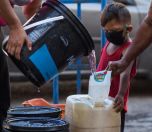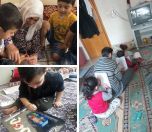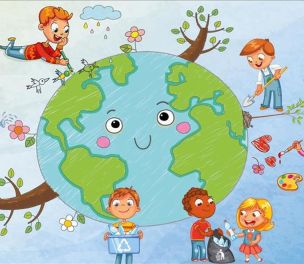* Photo: AA / Archive
Click to read the article in Turkish
United Nations Children's Fund (UNICEF) Representative to Turkey Philippe Duamelle has penned an Op-ed entitled "Children's Day and COVID-19" on the occasion of April 23 Children's in Turkey. Published on the official website of UNICEF, we are sharing the full article:
***
Today, the 23rd of April, marks National Sovereignty and Children's Day in Turkey. On this day 100 years ago, the Turkish Grand National Assembly met for the first time. Nine years later the founder of the Turkish Republic, Mustafa Kemal Atatürk, declared the 23rd of April as Children's Day in recognition of children's status as the future of Turkey.
In any other year, under "normal" circumstances, people across the country would celebrate this holiday as they always have. Schools and other institutions would organize large public ceremonies, often outdoors. Government officials, from local civil servants to the President himself, would hand over their official duties to child representatives for a day. And the Grand National Assembly would hold a special session, chaired by children, highlighting the issues they care about most.
As UNICEF's Representative to Turkey, I would also take the opportunity of this special day to reflect, together with children and partners, on the great progress made over the years in protecting the rights and improving the lives of millions of children, particularly the most vulnerable, and also look at the work that remains to be done.
UNICEF first opened its doors in Turkey in 1951. In the nearly seven decades since, we have partnered closely with the government, civil society, private sector and children themselves, on key areas such as education, child protection, social protection and health, in line with the United Nations Convention on the Rights of the Child.
Nine years ago, when the conflict in Syria forced innocent civilians across the border into Turkey in search of safety, the government, UNICEF and many other partners redoubled efforts to meet Syrian children and their families' most critical needs. This comprehensive response, led by the Turkish authorities, has improved the lives of about 4 million refugees in Turkey, mainly Syrians, including 1.7 million children.
But this year is not any other year, and these are far from normal circumstances. Today, the streets are quiet, and schools are closed.
This year, the world is facing a grave and unprecedented threat. The COVID-19 pandemic has reached an unimaginable scale, with some 2.5 million confirmed cases globally and over 170,000 deaths to date. While so far, the direct health impact of the pandemic has been far milder for children than for other age groups, the anticipated socio-economic impacts—if not addressed—could be devastating for them.
In Turkey, a national response plan has been activated, including a range of measures to reduce infections and respond vigorously to existing cases, in line with recommendations from the World Health Organization and with the support of agencies like UNICEF.
UNICEF and partners are supporting the Turkish government to scale up risk communication campaigns in multiple languages; ensure access to essential services, particularly in health, education and child protection; provide urgent sanitation and hygiene supplies to the most vulnerable families; and harness the talents and energies of young people to amplify life-saving public health messages within their communities.
But as the situation in Turkey highlights, the biggest challenge for governments, civil society and the private sector the world over, is ensuring that the response to the pandemic does not compromise ongoing efforts to meet the needs of the most vulnerable children. These include refugees, children in urban slums and in conflict zones, members of marginalized communities, children with disabilities, and those living in state institutions or detention centers.
Social distancing and confinement measures, while necessary in the short-term, could pose serious, long-term threats to children's health, safety and well-being. As the global economy slows down as forecasted, governments must find ways to maintain or even increase public spending on social protection—or risk undoing the good progress on child rights made to date.
Globally, we are already seeing some early warning signs. Over 117 million children are missing out on life-saving health and nutrition services, such as immunization against polio or measles. More than 1.5 billion children have had their education suspended or disrupted due to widespread school closures. And this year alone, as many as 66 million children could fall into extreme poverty as a result of the crisis.
As UN Secretary-General Antonio Guterres warned last week, what began as a health crisis risks evolving into a broader child rights crisis.
But it does not have to be this way. This pandemic, while devastating, has nonetheless given the world a rare opportunity to radically transform the way we live and work together—and to think hard about the kind of future we want to bestow upon our children. We do not have much time, and much is at stake.
As the famed writer Arundhati Roy wrote recently, this pandemic is a portal. We must have the courage to walk through it confidently, together, toward a safer and more just world.
Happy Children's Day!
(PD/AÖ/SD)







asas.jpg)

